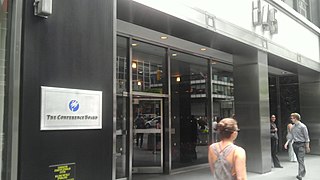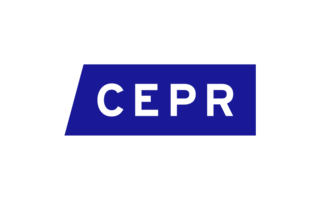
The International Monetary Fund (IMF) is a major financial agency of the United Nations, and an international financial institution funded by 190 member countries, with headquarters in Washington, D.C. It is regarded as the global lender of last resort to national governments, and a leading supporter of exchange-rate stability. Its stated mission is "working to foster global monetary cooperation, secure financial stability, facilitate international trade, promote high employment and sustainable economic growth, and reduce poverty around the world." Established in July 1944 at the Bretton Woods Conference, primarily according to the ideas of Harry Dexter White and John Maynard Keynes, it started with 29 member countries and the goal of reconstructing the international monetary system after World War II. It now plays a central role in the management of balance of payments difficulties and international financial crises. Through a quota system, countries contribute funds to a pool from which countries can borrow if they experience balance of payments problems. As of 2016, the fund had SDR 477 billion.

Macroeconomics is a branch of economics that deals with the performance, structure, behavior, and decision-making of an economy as a whole. This includes regional, national, and global economies. Macroeconomists study topics such as output/GDP and national income, unemployment, price indices and inflation, consumption, saving, investment, energy, international trade, and international finance.

In the economics study of the public sector, economic and social development is the process by which the economic well-being and quality of life of a nation, region, local community, or an individual are improved according to targeted goals and objectives.

Montek Singh Ahluwalia is an Indian economist and civil servant who was the Deputy Chairman of the Planning Commission of India, a position which carried the rank of a Cabinet Minister. He tendered his resignation for this post in May 2014 following the impending end of the UPA II regime at the center. He was previously the first Director of the Independent Evaluation Office at the International Monetary Fund.
A green economy is an economy that aims at reducing environmental risks and ecological scarcities, and that aims for sustainable development without degrading the environment. It is closely related with ecological economics, but has a more politically applied focus. The 2011 UNEP Green Economy Report argues "that to be green, an economy must not only be efficient, but also fair. Fairness implies recognizing global and country level equity dimensions, particularly in assuring a Just Transition to an economy that is low-carbon, resource efficient, and socially inclusive."

The Intergovernmental Group of Twenty-Four on International Monetary Affairs and Development, or The Group of 24 (G-24) was established in 1971 as a chapter of the Group of 77 in order to help coordinate the positions of developing countries on international monetary and development finance issues, as well as and to ensure that their interests are adequately represented in negotiations on international monetary matters. Though originally named after the number of founding Member States, it now has 28 Members. Although the G-24 officially has 28 member countries, any member of the G-77 can join discussions.

The Indian School of Business (ISB) is a not for profit business school established in India in 2001. It has two parallel campuses in India, in Hyderabad (Telangana) and Mohali (Punjab). It offers certificates in various post-graduate management programs. ISB became the 100th Triple Accredited business school in the world upon achieving AMBA accreditation on 12 May 2020.
Kristin J. Forbes is an American macroeconomist and policy adviser currently serving as the Jerome and Dorothy Lemelson Professor of Management and Global Economics at the MIT Sloan School of Management. She was formerly a member of the White House Council of Economic Advisers, and an external member of the Monetary Policy Committee of the Bank of England. Forbes' research focuses on international macroeconomics, monetary economics, and macroprudential policy. Alongside her academic appointments, she sits on advisory boards to the Federal Reserve Bank of New York, International Monetary Fund, and Bank for International Settlements.
The Institute of Policy Studies (IPS) is a think-tank that studies and generates public policy ideas in Singapore. Established in 1988, IPS became an autonomous research centre of the Lee Kuan Yew School of Public Policy at the National University of Singapore in 2008. A centre for social indicators research, Social Lab, was set up by IPS in November 2013. The board of directors at the institute includes high ranking Singapore government officials, diplomats, directors of multinational businesses, and leaders of academic institutions.

Raghuram Govind Rajan is an Indian economist and the Katherine Dusak Miller Distinguished Service Professor of Finance at the University of Chicago's Booth School of Business. Between 2003 and 2006 he was Chief Economist and director of research at the International Monetary Fund. From September 2013 through September 2016 he was the 23rd Governor of the Reserve Bank of India. In 2015, during his tenure at the RBI, he became the Vice-Chairman of the Bank for International Settlements.

The Conference Board, Inc. is a 501(c)(3) non-profit business membership and research group organization. It counts over 1,000 public and private corporations and other organizations as members, encompassing 60 countries.
The University of Maryland School of Public Policy is one of 14 schools at the University of Maryland, College Park. The school is located inside the Capital Beltway.

The Centre for Economic Policy Research (CEPR) is an independent, non‐partisan, pan‐European non‐profit organisation. It aims to enhance the quality of policy decisions through providing policy‐relevant research, based soundly in economic scholarship, to policymakers, the private sector, and civil society.
Shaibal Gupta was an Indian social scientist and political economist whose work focused on the economy of the Indian state of Bihar. He was the founder and member-secretary of the Asian Development Research Institute in Patna, Bihar. His research was a contributor to the rollout for various state government led societal development programs and economic reforms in the state.
Yamini Aiyar was the president and chief executive of the Centre for Policy Research (CPR), New Delhi, a public policy research think tank. She was appointed President of CPR in 2017. She was previously a senior research fellow and founder, in 2008, of the Accountability Initiative (AI) at the centre. Through Accountability Initiative, Yamini is credited with pioneering one of India's largest expenditure tracking surveys for elementary education. She is also regular columnist in newspapers, such as The Hindustan Times, LiveMint, and The Indian Express'.
Economic Advisory Council to the Prime Minister of India (PMEAC) is a non-constitutional, non-permanent and independent body constituted to give economic advice to the Government of India, specifically the Prime Minister. The council serves to highlight key economic issues facing the country to the government of India from a neutral viewpoint. It advises the Prime Minister on economic issues like inflation, microfinance, and industrial output.

The Bharatiya Janata Party (BJP) is one of the major political parties in India and is the main opposition party during the 15th Lok Sabha. It contested the 2014 parliamentary election along with their supportive parties, to form National Democratic Alliance with Narendra Modi as its Prime Ministerial candidate and party president Rajnath Singh as the chief-of-election of campaign. The important issues during the campaign included price hikes, corruption, the economy, national security, basic infrastructure such as roads and railways, and supplying basic needs such as electricity and water. The party promised a vibrant and participatory democracy, inclusive and sustainable development, quality of life, productive youth, a globally competitive economy, open and transparent government, and pro-active and pro-people governance in its manifesto.

National Council of Applied Economic Research (NCAER) is India’s oldest and largest independent, non-profit, economic policy research think tank. Established in New Delhi in 1956, it acquired considerable national and international standing within only a few decades of its founding. It is one of a handful of think tanks globally that combine rigorous analysis and policy outreach with deep data collection capabilities, especially for household surveys.

The NITI Aayog serves as the apex public policy think tank of the Government of India, and the nodal agency tasked with catalyzing economic development, and fostering cooperative federalism and moving away from bargaining federalism through the involvement of State Governments of India in the economic policy-making process using a bottom-up approach. Its initiatives include "15-year road map", "7-year vision, strategy, and action plan", AMRUT, Digital India, Atal Innovation Mission, Medical Education Reform, agriculture reforms, Indices Measuring States’ Performance in Health, Education and Water Management, Sub-Group of Chief Ministers on Rationalization of Centrally Sponsored Schemes, Sub-Group of Chief Ministers on Swachh Bharat Abhiyan, Sub-Group of Chief Ministers on Skill Development, Task Forces on Agriculture and up of Poverty, and Transforming India Lecture Series.
Maxwell Opoku-Afari is a Ghanaian economist and currently the First Deputy Governor of the Bank of Ghana. He was appointed to this position on August 7, 2017.












